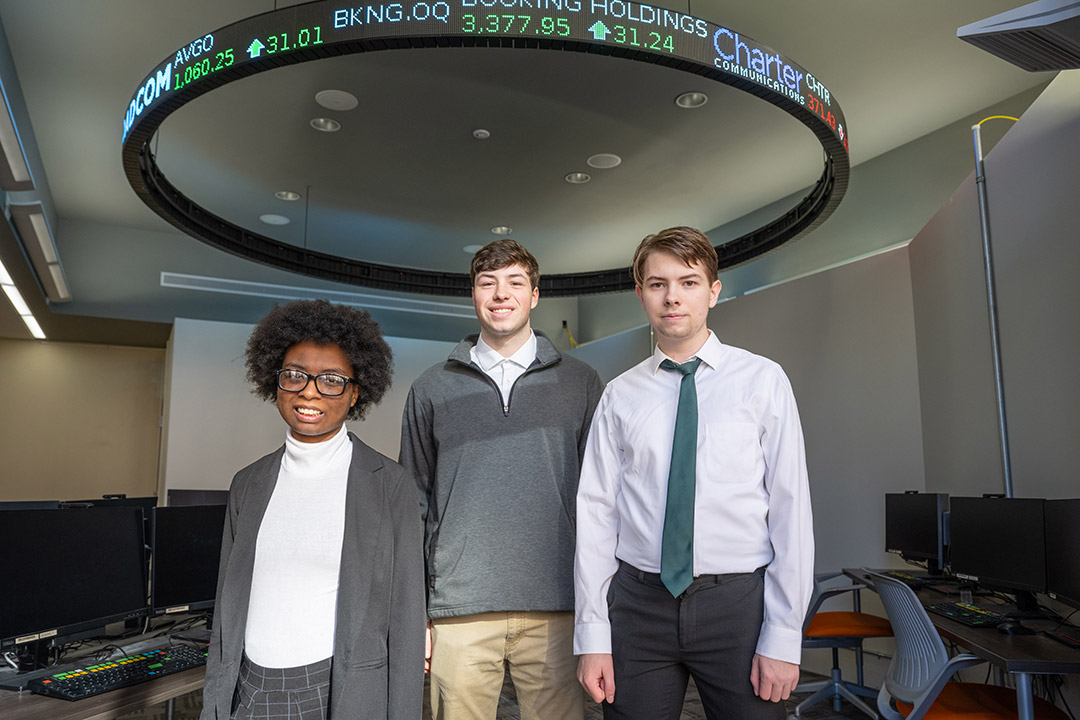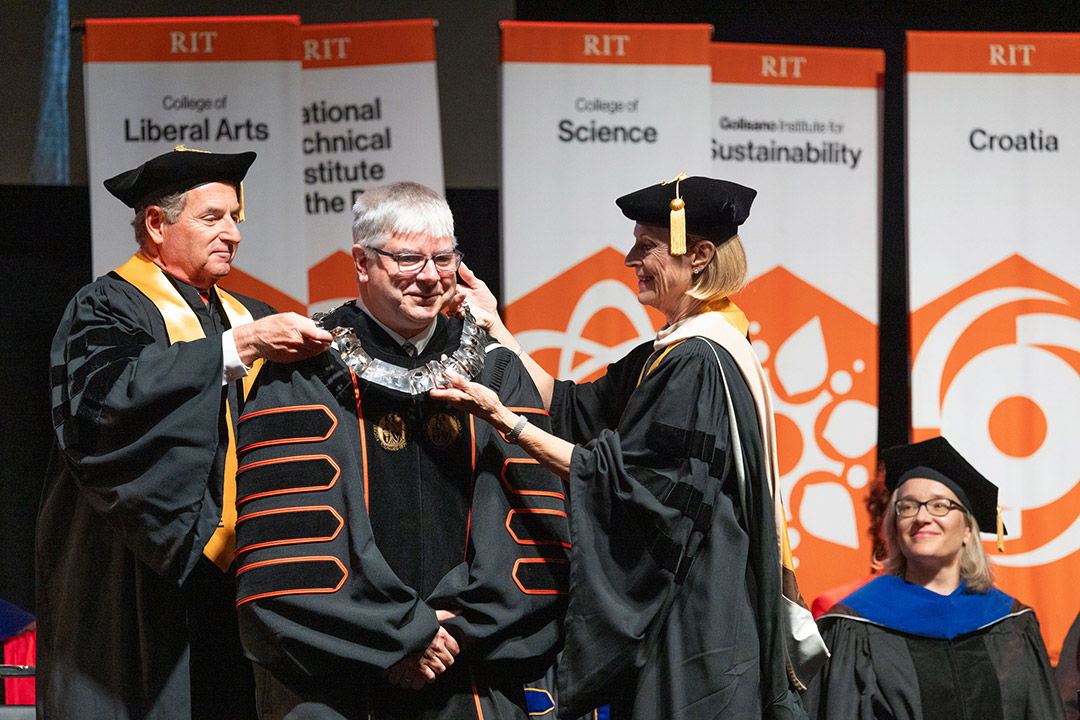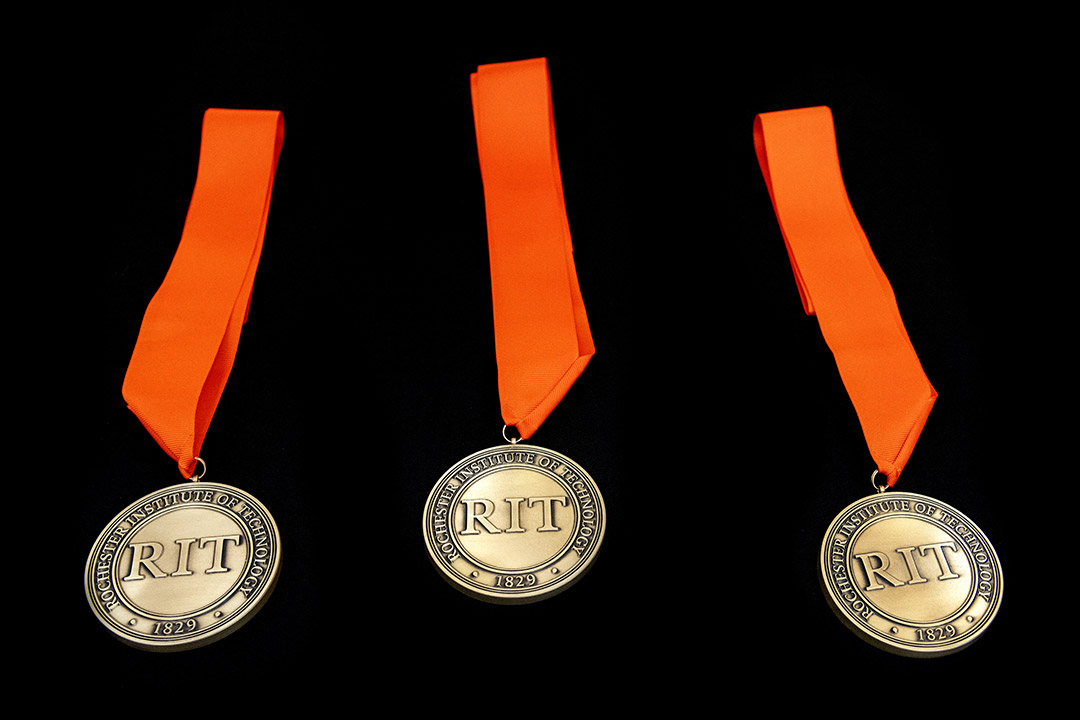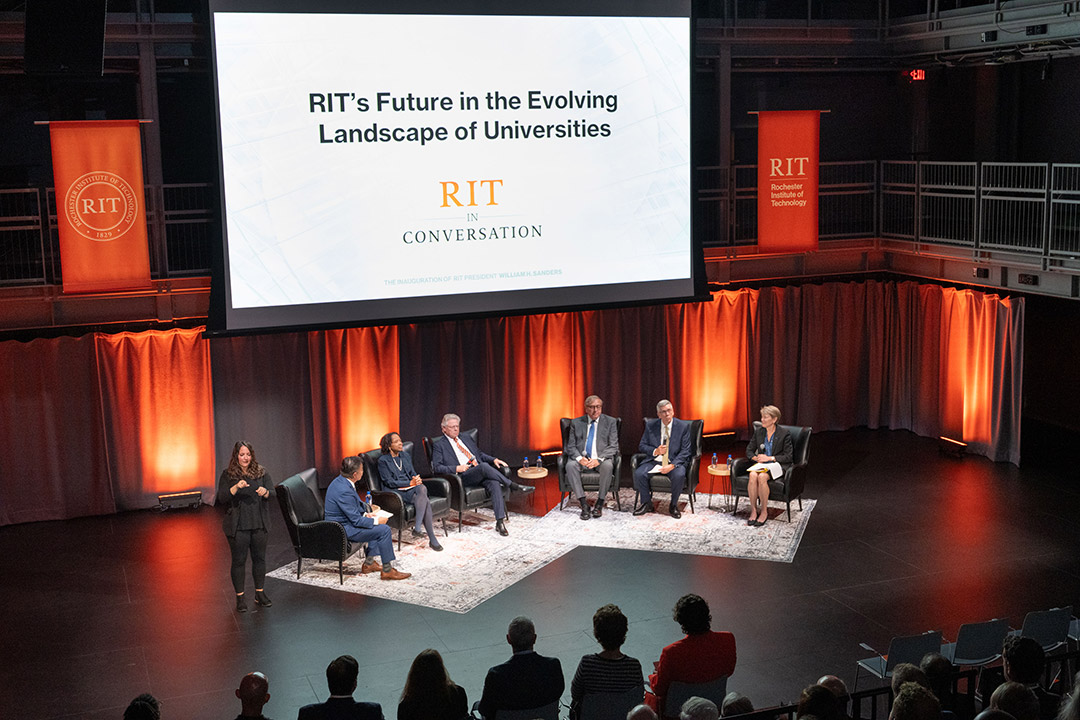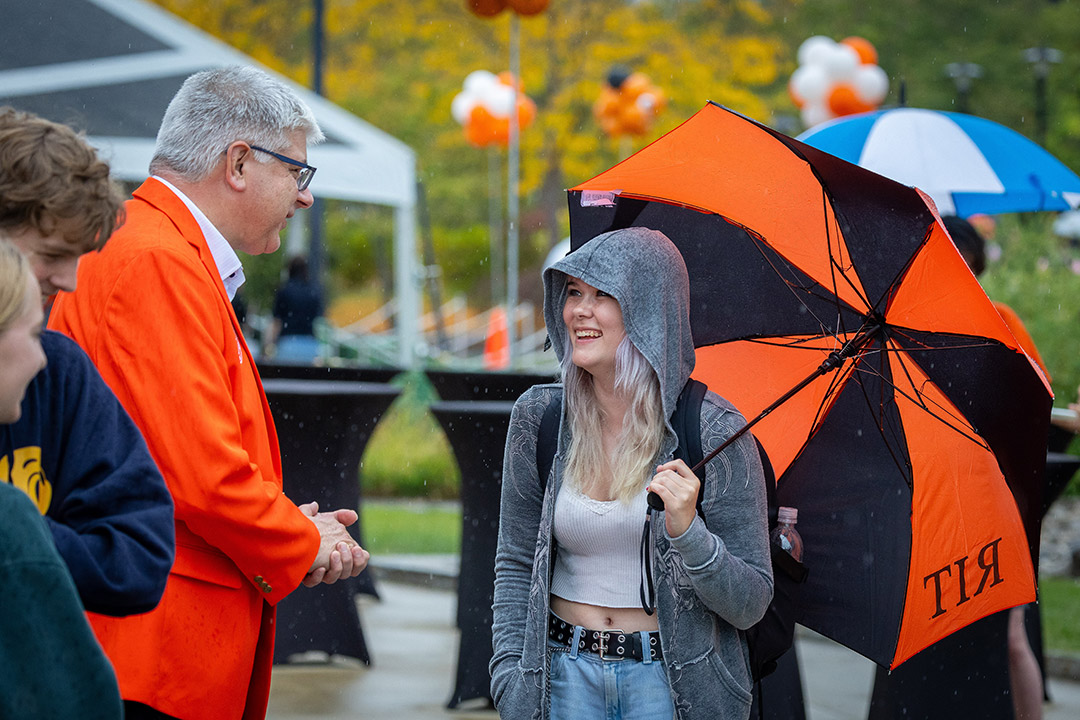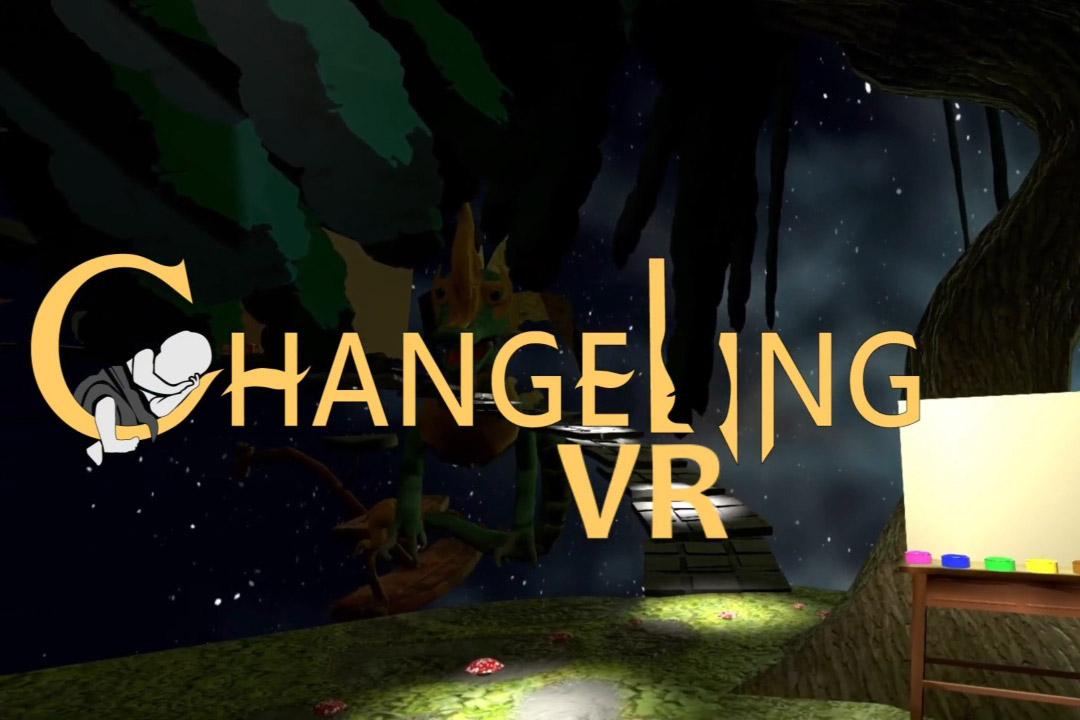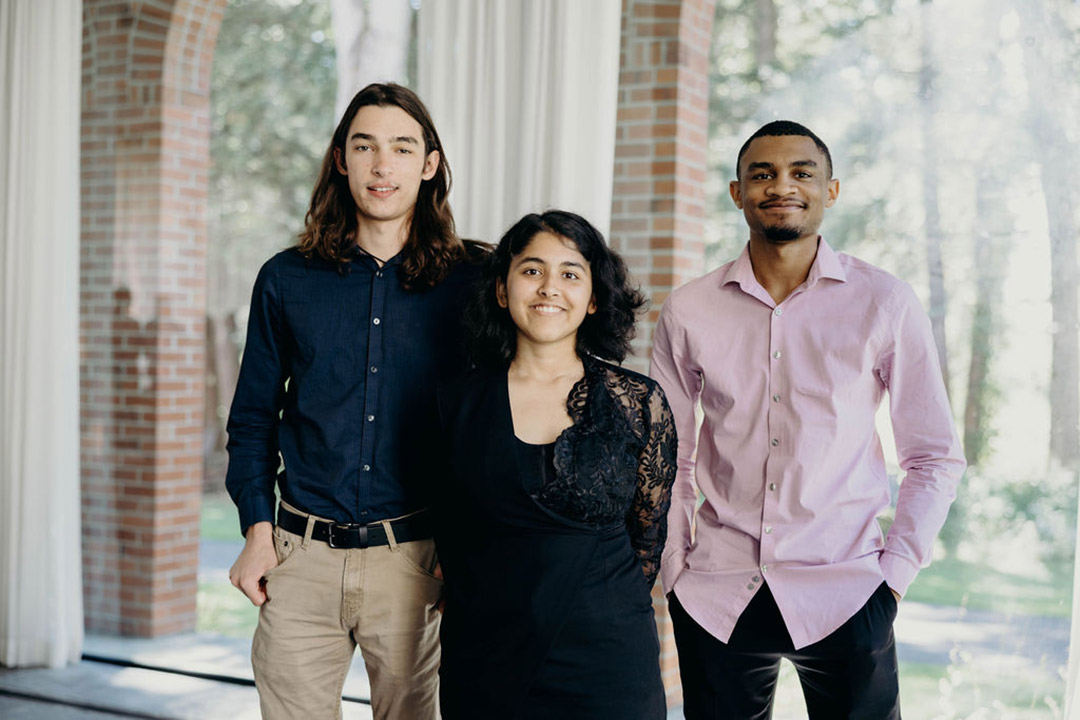RIT secures top spot in North America, third globally in Bloomberg 2023 Global Trading Challenge
An interdisciplinary team of RIT students finished No. 1 in North America and third globally in the Bloomberg 2023 Global Trading Challenge, marking the first time the university has participated in the international competition.
Carter Ptak (software engineering), Evan Macko (finance), and Alexandria Walker (computer science) comprised the “Tigers Trading” team in the competition, which included 2,007 teams from 310 universities in 38 countries conducting simulated investing over six weeks.
The team—supported by faculty advisor and finance professor Hao Zhang—came together as members of the Financial Management Association (FMA), a Saunders College of Business club open to all students at the university.
“I was definitely thrilled,” said Ptak, the team’s captain, from Portland, Ore. “We worked very hard, and I personally spent many hours researching so I was very happy to see that work pay off.”
The trading challenge is the only university investment competition that solely relies upon Bloomberg Terminals in support of optimized business solutions. At RIT, the terminals are a featured resource within the Sklarsky Center for Business Analytics Center at Saunders College, combining industry-standard tools for financial trading with Saunders’ strengths across finance and analytics.
Ptak said the RIT team placed trades over six weeks using $1 million of virtual money, with the goal to generate the largest possible return. “We were only allowed to trade specific stocks as set by Bloomberg—10,000 of the world’s biggest companies,” he observed. “All trades had to be placed through the Terminals.”
“I definitely learned a lot about using the Bloomberg Terminals—none of us had experience on it before this, but throughout the course of the competition we learned the power of the Terminals,” added Ptak, a second-year student.
He credited the “unique composition” of RIT’s team for its success in the competition. “Our team had a software engineering major, a computer science major, and a finance major, which is unusual for a competition like this, and I think that benefited us,” he said. “The diversity of education on our team was essential in allowing us to think outside of the box when making trading decisions.”
“To win against 2,000 other teams, we knew that we couldn’t think like traditional investors, and having a mix of finance and non-finance majors allowed us to do that,” he added.
Zhang hopes the group’s impressive performance in the competition will increase both visibility for the FMA club—made up of students who come from both business and technical backgrounds—and RIT students’ interest in investing and finance.
“These students did a fantastic job,” said Zhang, a 2019 recipient of the Eisenhart Award for Outstanding Teaching, who has served as the club’s advisor for the last decade. “They were able to come up with a trading strategy based on technical analysis, worked diligently to search relevant information through Bloomberg Terminals, and then implemented the strategy successfully.”
Eddie Ditomasso, the FMA club’s president at RIT, said he was “thrilled for the team and proud of them for the effort they put forth,” and to see club members from different RIT colleges take an interest and excel in finance.
“I attribute the team’s success to a blend of hard work and effective communication,” said Ditomasso, a fourth-year finance and management information systems (MIS) double major from northern New Jersey. “This is a great example of how we help our club members learn valuable financial skills.”
“The team’s success also reflects the quality of education and resources provided by RIT and Saunders College of Business,” added Zhang, who also serves as the director of the BS in finance and MS in finance programs. “The curriculum, faculty, and access to cutting-edge tools, like Bloomberg Terminals, equip students with the knowledge and skills needed to excel in real-world scenarios.”
Latest All News
- William H. Sanders installed as RIT’s 11th presidentRIT will become a destination not just for students but for ideas, Bill Sanders said as part of formal ceremonies to install him as RIT’s 11th president. The university, he said, will be a place where breakthroughs in artificial intelligence, sustainability, and cybersecurity are born; where artists and technologists co-author the future; that graduates leaders prepared for careers that don’t even exist yet; where interdisciplinary research tackles real-world problems; and where the global footprint expands while the commitment to Rochester is deepened. “None of what we aspire to do together can be done without passionate people,” Sanders said. “We have a beautiful campus and the buildings and Tiger Athletics facilities that we have built in the last five years are best in their class. But I believe fundamentally that people are what drives RIT.” Carlos Ortiz/RIT Andreas Cangellaris, founding president of NEOM University in Saudi Arabia, served as keynote speaker at the ceremony. Hundreds of people, including delegates from 42 universities and state and community leaders, attended the tradition-filled ceremony on Sept. 26 at Gordon Field House and Activities Center. Hundreds more watched online. In his inaugural remarks, Sanders announced that RIT has secured gifts to establish five new endowed professorships, adding to the 49 that exist today. He outlined progress on the development of RIT’s new strategic framework, which he calls a shared ambition to build a university that is more inclusive, innovative, and interconnected than ever before. “As we stand at the threshold of a new chapter, I see a university that is not only ready for the future—but ready to shape it,” he said. Sanders was officially installed as president by Susan Puglia, chair of the RIT Board of Trustees, and vice chairs Susan Holliday ’85 (MBA) and Frank Sklarsky ’78 (business administration accounting). They presented him with the Presidential Collar of Authority, created in 1983 by the late Hans Christensen, the first Charlotte Fredericks Mowris Professor of Contemporary Crafts in the School for American Crafts. Andreas Cangellaris, founding president of NEOM University in Saudi Arabia, served as keynote speaker at the ceremony. Cangellaris and Sanders worked together at the University of Arizona and the University of Illinois at Urbana-Champaign. Cangellaris said Sanders is a natural leader who encourages cross-disciplinary collaboration and builds trust. Elizabeth Lamark Bill Sanders delivers remarks at the ceremony marking his inauguration as 11th president of RIT. Those traits, he said, are especially valuable now because of the potential and promise of artificial intelligence. Universities must rethink how they teach and learn, research and discover, and inspire and innovate. “To meet the moment, we need leaders who are wise, courageous, visionary, collaborative, and inspiring — leaders we can trust to bring the university community and all its stakeholders together, to comprehend the challenges and propose and advance the right path forward,” he said. “Bill Sanders is that leader, for this very moment.” Inauguration events also included faculty presentations, a panel on the future of higher education, campus tours, and a picnic with students. Sanders has nearly 40 years of experience in higher education, having most recently served as the Dr. William D. and Nancy W. Strecker Dean of the College of Engineering at Carnegie Mellon University in Pittsburgh from 2020 to 2025. He started at RIT on July 1. Read the full text of President Sanders’s inauguration remarks.
- RIT announces creation of five new endowed professorshipsThe creation of five new endowed professorships, together valued at $15 million, was announced Sept. 26 during the inauguration of the university’s 11th president, Bill Sanders. “Endowed professorships are important vehicles to retain and recruit our best faculty, formally and publicly acknowledge their excellence, and provide discretionary funds to allow them to take risks in research, enhance their teaching, and inspire students,” said Sanders. The new endowed professorships are: The Budington Family Professorship, which will support a faculty member in the College of Engineering Technology, is funded by Board of Trustees member Jonathan Budington ’91 (graphic communications) and his wife, Susannah Budington, to retain and recruit top faculty. The Jeffrey K. Harris Professorship will support a faculty member who exhibits multidisciplinary strategic thinking to solve important research challenges and advance RIT’s unique approach to multidisciplinary education in ways that are important to the university’s mission. It is funded by Jeffrey Harris ’75 (photographic sciences), past chair of RIT’s Board of Trustees, and his partner, Joyce Pratt, chair of RIT’s College of Liberal Arts National Council. The Ludwick Family Professorship will support the university’s strategic objective of recruiting and retaining distinguished scholars and teachers. It is funded by Worth Ludwick ’78 (MBA); her husband, Andy Ludwick; and their family, via the Santa Rita Foundation. The Frank and Ruth Sklarsky Professorship will initially support a faculty member whose research focus is in artificial intelligence, while future appointees will address critical emerging topics in science and technology. It is funded by Frank Sklarsky ’78 (business administration accounting), vice chair of RIT’s Board of Trustees, and his wife, Ruth Sklarsky. The Leo C. and Margaret J. Williams Professorship will support a faculty member in the College of Science. It is funded by Anna Williams, who is the mother of Molly Roesch, a 2023 graduate of RIT’s chemistry program, to honor her parents and Roesch’s grandparents. “Great universities are built by visionaries—faculty who imagine, create, and innovate—and by donors whose generosity makes that work possible,” said Phil Castleberry, vice president for University Advancement. “Endowed professorships unite these two forces, giving faculty the support to pursue bold ideas and students the chance to learn from world-class scholars. We are deeply grateful to our donors for investing in people, in discovery, and in the future of RIT.” Over time, these professorships will be awarded to current or new faculty based on their demonstrated academic excellence. Each of the new professorships, once approved by RIT’s Board of Trustees, will be endowed at $3 million, for a total of $15 million. RIT now has 54 endowed professorships.
- University leaders gathering for inauguration tackle important questions facing academiaUniversity presidents and leaders from across academia gathered in Rochester to discuss the rapidly shifting landscape of higher education. The distinguished experts noted how universities at the center of this change—including RIT—can use headwinds as opportunities to propel forward. Elizabeth Lamark Sin Min Yap, left, vice president of strategy for Synopsys, Inc., moderated the panel on the future of higher education. The event, called RIT in Conversation, was part of the inauguration of RIT’s 11th president, Bill Sanders, on Sept. 26. The program featured a panel where academic leaders shared their thoughts on some of the most important questions facing higher education today. The panel included:Sin Min Yap, vice president of strategy for Synopsys, Inc., as the panel moderator Gilda Barabino, former president of Olin College of Engineering Andreas Cangellaris, founding president of NEOM University W. Kent Fuchs, president emeritus of University of Florida James Garrett, provost and chief academic officer at Carnegie Mellon University Sarah Mangelsdorf, president of University of Rochester. Cangellaris discussed how universities must balance preparing students for jobs that don’t yet exist with the traditional mission of preparing students for careers in established professions. “Universities should continue to be engines of knowledge creation,” said Yap. “At the same time, universities can use that knowledge to create a positive impact in society, preparing students to be leaders in professions that are evolving rapidly or have yet to be created.” Garrett addressed the value of a university education. He said that it’s about preparing young people to be productive contributors of society, with a global and interdisciplinary mindset. He also remarked that universities teach how important it is to continue to learn how to learn. “This is something I tell my students,” added Yap. “The mind is like a parachute—it only works when it’s open.” Elizabeth Lamark Jeyhan Kartaltepe, associate professor in RIT’s School of Physics and Astronomy, explained her research with the James Webb Space Telescope at the inauguration event. When discussing the Rochester region’s 19 colleges and universities, Mangelsdorf remarked how higher education has taken on the mantle as an innovation and employment driver in the area. She also highlighted RIT and University of Rochester’s many collaborations and partnerships, including joining New York state’s Empire AI consortium—a partnership of leading public and private universities to advance responsible artificial intelligence—and the development of the Rochester Quantum Network, where researchers are using single photons over fiber-optic lines. In closing, the panel offered advice to RIT’s leadership about its future role in higher education. Barabino advised Sanders to value every member of RIT’s community and stay true to the university’s values. On a personal note, Fuchs wished great joy to the new president and his family. The program also featured five RIT professors who are pushing research and inspiring students. Faculty members included:Denis Cormier, the Earl W. Brinkman Professor of Industrial and Systems Engineering and founder and director of the New York state-supported Additive Manufacturing and Multifunctional Printing (AMPrint) Center. He discussed a few projects that excite him the most, including 3D printing drones and developing a high-speed metal inkjet 3D printing process. Jeyhan Kartaltepe, an astrophysicist in the School of Physics and Astronomy. She talked about studying the history of the universe and leading the largest program accepted for the first two years of observations with the James Webb Space Telescope. Ashique KhudaBukhsh, assistant professor in the Department of Software Engineering and affiliate of the ESL Global Cybersecurity Institute. He discussed using artificial intelligence for social impact and how his research is helping strengthen the safety guardrails of large language models. Josh Owen, the Vignelli Distinguished Professor of Design and director of the Vignelli Center for Design Studies. He shared how keeping a foothold in the educational and professional sectors is important for preparing students who can tackle real-world problems. Thomastine Sarchet-Maher, assistant professor in the Department of Deaf Education at the National Technical Institute for the Deaf. She spoke about her experience leading deaf education development projects in Southeast Asia and Africa.
- Student picnic begins inauguration festivitiesFood, music, trivia contests, and plenty of selfies were featured at a free student picnic Thursday outside the Gene Polisseni Center to kick off two days of events for the inauguration of Bill Sanders, RIT’s 11th president. “It’s great to see you all,” Sanders said. “I’ve quickly found in the 10 or 11 weeks that I’ve been here that what makes RIT really special is that sense of community. Wherever you’re from, whatever you’re studying, whatever your likes are, you can find a place here. And that’s really special to me.” Sanders, along with his wife, Emily, and their dog, Ollie, enjoyed music from the Brick City Singers and Proof of Purchase a capella groups. Sanders met with many students who came up to him after his remarks. Carlos Ortiz/RIT RIT President Bill Sanders met with students, including Reese Fernandez, during a picnic Thursday. Mickey Polito, a fifth-year software engineering major from Webster, N.Y., wanted a selfie. Sanders asked Polito what his plans are after he graduates at the end of this semester. Polito said he was taking a job with More Vang, where he had a co-op. “He’s so accessible, extraordinarily nice, extraordinarily kind,” Polito said. “I’m so glad he’s meeting with students.” Reese Fernandez, a third-year design and imaging technology major from Austin, Texas, asked Sanders what he likes about RIT. “There are so many possibilities here,” Sanders said. “I love all the majors and courses RIT has to offer.” Tyler Mahan, a fourth-year finance major from Calgary, Alberta, was one of four members of the RIT men’s hockey team who posed with Sanders after his remarks. “I came out here just to meet the president and invite him to one of our games,” Mahan said. “He’s awesome and seems to be a great guy. We had a great chat.” The inauguration ceremony begins at 2 p.m. Friday in the Gordon Field House and Activities Center.
- RIT-created virtual reality game ‘Changeling VR’ arrives on SteamMore than 300 RIT students have published Changeling VR, a new narrative mystery game on Steam. The virtual reality (VR) game is now available to download for free on the online game platform for early access. The community-built game is five years in the making. It has included students and faculty from RIT’s Golisano College of Computing and Information Sciences and the College of Art and Design. For many students, working on the game counted as a key co-op credit for their degree program. In Changeling VR, players take on the role of a detective who can see people’s thoughts and memories. Using these mystical powers and skills of deduction, players must work with a family to discover what is wrong with their baby. Each member of the family has their own unique level, making it like five VR games in one. For example, the mother’s level is ethereal, like floating through space. With the brother, players slingshot through a level in the style of his sketchbook. The father—an engineer—is faced with a series puzzles. Changeling VR Elouise Oyzon, associate director of the School of Interactive Games and Media (IGM), came up with the idea for Changeling VR while watching “Murder on the Orient Express.” “In detective stories, you interview all these people, and they give you their version of truth in flashbacks,” said Oyzon. “The VR genre is perfect for this because it can really give you a point of view. And in this game, we can give each family member’s memory a totally different vibe and aesthetic.” The project began during the COVID pandemic, when Oyzon noticed that many co-op opportunities in the industry were being put on hold. She had the idea for the VR game and thought it could be a great experiential learning experience in agile development. “Typically, IGM students on their first co-ops might work in quality assurance or user experience, but they don’t always get to do level design, narrative, or sound composition,” said Oyzon. “At the Changeling studio, they get to do the things they have been doing in class and even take on new roles.” Students on co-op with the Changeling studio worked full time and had the option to work remotely. Documentation was key for development because new co-op cohorts came in each semester. For Julian Alvia, a fourth-year game design and development major, the co-op was an opportunity to learn Unreal Engine, as opposed to the Unity game engine he uses in the classroom. As a team lead, he oversaw development and fixed bugs. Later, as a producer, he ran the studio’s daily stand-up meeting and weekly milestone meetings. “It was a challenge allowing people to be creative, while also meeting deadlines within the scope of what we wanted to do during our cohort,” said Alvia, who is from Waterbury, Conn. “It was rewarding learning how to be a leader and now that’s the direction I want to focus my career.” Changeling VR Alvia added, “Having a published game to your name is good to put on résumé and show future employers.” Kyle James still uses the skills he learned from working on Changeling VR. He graduated from the Combined Accelerated BS/MS in game design and development in 2024 and now works as a project a project manager for the STNDRD Fitness app. “As a co-op, being able to manage 80 people across disciplines was a huge learning process,” said James. Right now, the game is in Steam Early Access—a unique development model that allows games to be played as they progress towards a full release. The team plans to continue development for about 18 months. Four out of the seven eventual levels can now be played. Players speeding through the game can finish it in about 40 minutes, while others looking to explore can take hours. The game is published through RIT’s MAGIC Spell Studios. Download Changeling VR for free on Steam.
- Gap year fellows find their innovator grooveStudents with an itch to innovate are seeing their ideas take form with the support of RIT’s Gap Year Entrepreneurship Fellowship Program. Jonathan Bateman, Aidan Makinster, Michael Norton, and Hridiza Roy—all from RIT’s School of Individualized Study—comprise the seventh cohort of gap year fellows developing business ideas. Each fellow received a $20,000 stipend to use over two semesters, as well as business coaching from the Simone Center for Innovation and Entrepreneurship and Upstate Venture Connect, a network of business professionals. RIT alumnus and trustee Austin McChord established the fellowship for SOIS students as part of a larger gift to the university in 2017. The fellowship program launched in 2018 with its first fellow, Brandon Hudson. Since then, the program has supported a total of 28 fellows, including the current cohort. “Gap year fellows enjoy a rare opportunity to present their ventures directly to Austin, gaining thoughtful, actionable feedback on their biggest challenges, growth strategies, and next steps,” said Meg Walbaum, director of Strategic Partnerships in University Studies. “The experience leaves a lasting impact, shaping both their businesses and their personal development.” Entrepreneurial thinking sets the gap year fellows apart from their peers and adds a real-world advantage to their college experience. This year’s group is exploring software to prevent AI-powered and deepfake impersonations, and ways to improve underwater drones, 3D digital animation, and mountain bikes. Bateman, a third-year student from Denver, is developing a free mobile app to authenticate the identities of one’s closest contacts if faced with a targeted deepfake attack. His app, Real Recognizes Real AI (realxreal.ai), uses multifactor authentication to ensure trusted contacts are who they purport to be. The software personalizes methods used by commercial enterprises. Through SOIS, Bateman has studied applied math and computing security with anthropology and sociology to understand how people use and manipulate technology. “I want to prioritize security, privacy, and ethics,” Bateman said. “It’s not a hindrance to innovation.” His goal is to make Real Recognizes Real AI available on the iOS app store by December. Norton, from Long Island, N.Y., tried different majors before he discovered SOIS last year. “I realized I wanted something in between different types of engineering that didn’t exist,” said Norton, who expects to graduate in 2026 or 2027. He applied for a fellowship to build underwater drones using 3D printing and open-source software. Norton founded RocIn Industries LLC., to develop the proprietary technology for his fleet of water-bottle shaped drones. Although he works independently on the project, Norton runs ideas by “Brutus,” a chatbot he customized from an open-source AI model. Unlike ChatGPT, Brutus is a closed model that only Norton can access. “I’m a thinker and an ideas guy,” Norton said. “I have a passion for engineering and engineering work. My life goal is to be a successful engineer.” Makinster, from Waterloo, N.Y., has used his fellowship to develop a mountain-bike part he designed for his senior capstone project. His concept for an adjustable handlebar stem would allow riders to switch the handlebar position while ascending and descending hills, allowing for greater “ease, speed, and safety,” he said. Makinster used his capstone project as a blueprint and began experimenting with 3D-printed parts and different mechanisms for moving the stem into the preferred position. By mid-spring, Makinster anticipates having a working prototype or, even, a final version. “My childhood dream is to open a store and sell bike parts,” Makinster said. “That was always my end goal.” Makinster also received the Gap Year Enhancement Award and an additional $20,000. Roy is concentrating her gap year into one semester to fine-tune a 3D stylized animation tool she built during the spring semester and to engage potential end-users. Her team includes Charlie Blaker, a third-year student in RIT’s 3D digital design program, and Jinhyo Huh, a computer graphics graduate student at Stanford University. They are analyzing existing research and techniques for achieving a painterly look for 3D animation and interviewing 3D artists about their workflow and general preferences. Roy’s fascination with 3D computer graphics led her to study the mathematics and computer science behind digital animation. Her fellowship focuses on simplifying the process animators use to create the appearance of brush strokes on digital objects. Movies such as Spider-Man: Into the Spider-Verse and The Wild Robot popularized a stylized look achieved by combining different software applications. Roy’s 3D stylized animation tool bypasses the cumbersome process and integrates into existing software. She will attend LightBox Expo in Pasadena, Calif., in October to engage with more artists and seek feedback on her product. “I wanted to create something that automates a stylized look while also giving artists control, and I have been able to explore both the algorithmic and the human side of that space,” Roy said. “The gap year fellowship is an absolutely amazing program. I have gotten the opportunity to research the mathematics of stylized looks within 3D animation, and gained extremely valuable insights from and connected with a lot of 3D artists.” About the Gap Year Entrepreneurship Fellowship Program The Gap Year Entrepreneurship Fellowship Program began in 2018 within the School of Individualized Study to encourage students to pursue business ideas while earning a college degree. RIT alumnus and trustee member Austin McChord established the program as part of his $50 million gift to RIT in 2017. McChord started Datto, a global provider of data protection, in 2007, with an idea he had as an RIT student. Vista Equity Partners acquired Datto in 2017 for around $1.5 billion. McChord is currently the CEO of Casana, a healthcare technology firm, which microsystems engineering alumnus Nicholas Conn started at RIT.



